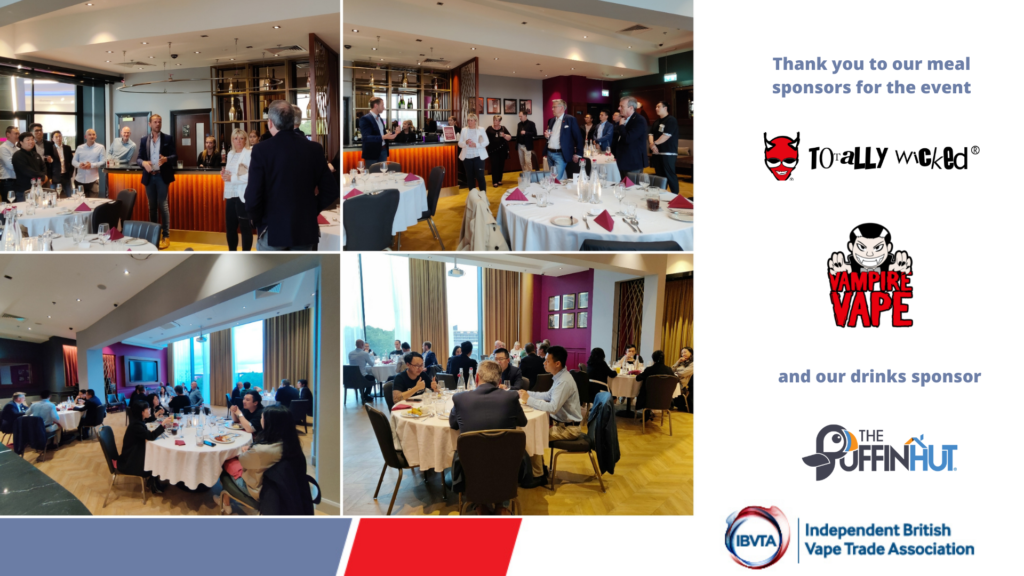IBVTA hosts successful industry roundtable event

The IBVTA hosted an industry roundtable in Birmingham last weekend. It was a great opportunity to get leading businesses in retail, liquid, and device manufacturing together to discuss topical issues and challenges, and to generate ideas and solutions that will strengthen the UK’s vaping sector.
Thank you to everyone who attended and shared their ideas, it was a really fruitful discussion and one which will inform the IBVTA’s work for the sector.
Here is a synopsis of the discussion.
(Note: This was an open discussion under the “Chatham House Rule”. Hence none of the discussion points or opinions raised represents any agreed position of the IBVTA.)
• Non-compliant products – how can we help to get these off the market?
- A number of more reputable manufacturers in China have been able to remove non-compliant products under their brands from the UK market fairly effectively.
- Action taken at importer level by the UK authorities must be built upon.
- Investment by government in enforcement agencies is believed by some to be the pinch point.
- Some also believe that better funding for Trading Standards teams would go towards tackling the issue at retail level.
- The current trends could also be a temporary blip – every sector has to go through the pain of periods of non-compliance by bad actors, but ultimately legitimate businesses survive to the detriment of grey and black-market suppliers.
• Puff counts and consumer rights:
- Puff counts for disposable products are often arbitrary, and not generally realistic in terms of correctly informing consumers.
- Some manufacturers and retailers want to see puff counts removed from all disposable product packaging. The e-liquid volume that a consumer can get from the product is probably a more meaningful measure.
- Consensus that puff counts on packaging is marketing led, and at risk of becoming a never-ending topic unless agreed industry-wide standards are in place.
• U18 sales and use – age verification – what more can industry do?
- Seeing older peers drives younger kids to try vaping, and kids are by definition risk takers – that which is prohibited becomes more attractive and a behaviour they engage in to feel and appear older.
- To a certain extent sales to youth might be linked to sales of non-compliant products by a generally non-compliant supply chain.
- All responsible actors in the industry should promote age of sale compliance.
- The IBVTA will continue to work with enforcement agencies.
• Register or license for vape retailers and businesses?
- Pros and cons to this idea.
- While on the surface it might be hoped that it would make businesses follow the rules, those that act outside the law are likely to continue to do so.
- There is currently no paid licencing system for tobacco retailers in the UK, and the register for tobacco and vaping retailers in Scotland currently has insufficient penalties attached.
- The cost of introduction would be borne by businesses who are selling the safest nicotine products, and it seems perverse to expect this of vape retailers when tobacco retailers would not be subjected to it.
• Chinese regulation and current/upcoming impact. Safeguarding the sector in the UK and ensuring continued suitable product development:
- Not clear yet what the long-term implications of the new regulations will be.
- There are still details yet to be announced by the Chinese authorities.
- Some OEM factories may still break the law and try to export non-compliant products. We have little feel for how strict or effective any enforcement might be.
- Not all current factories will get a licence.
- The introduction of the regulations is a good reminder to UK businesses only to deal with reputable manufacturers and suppliers.